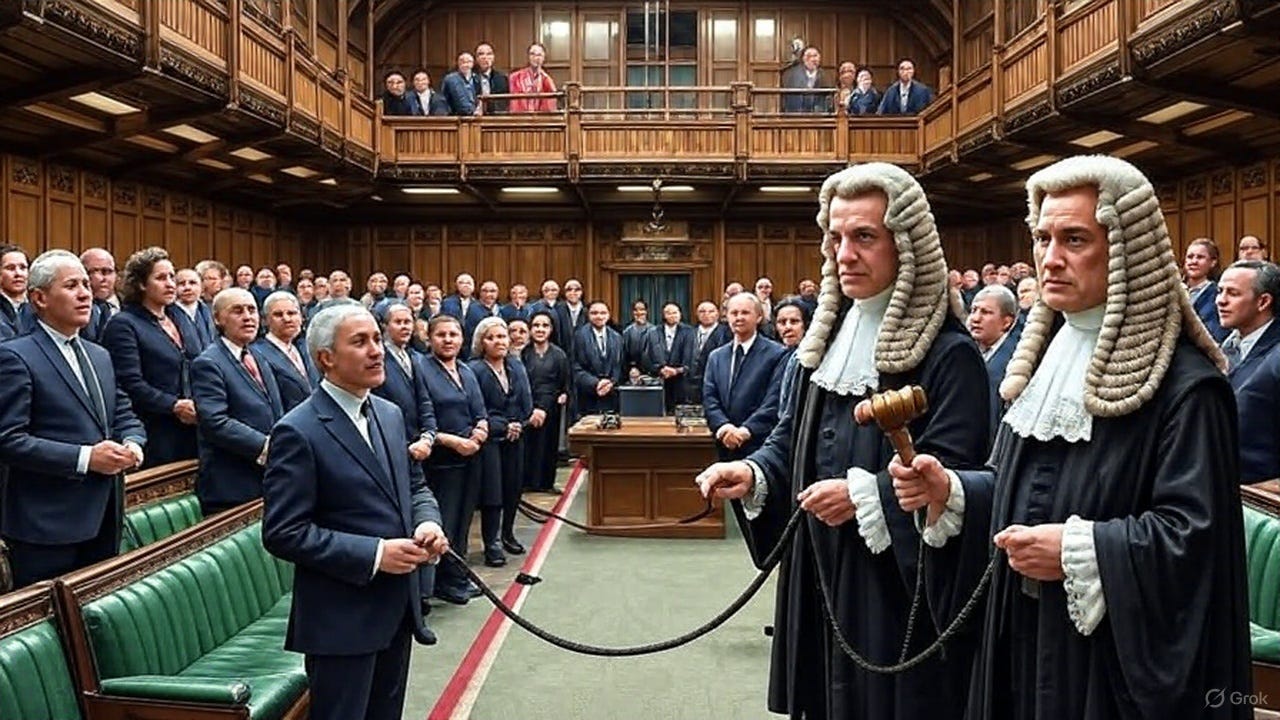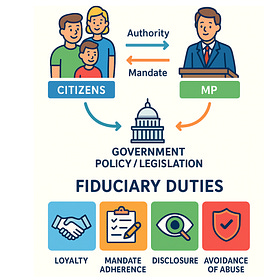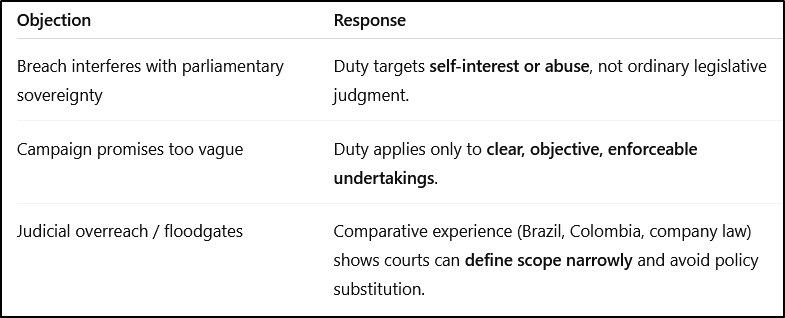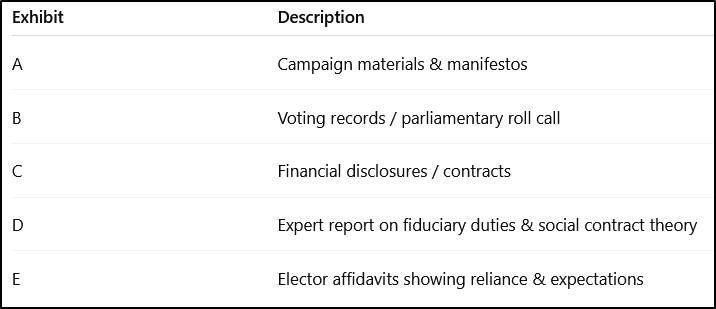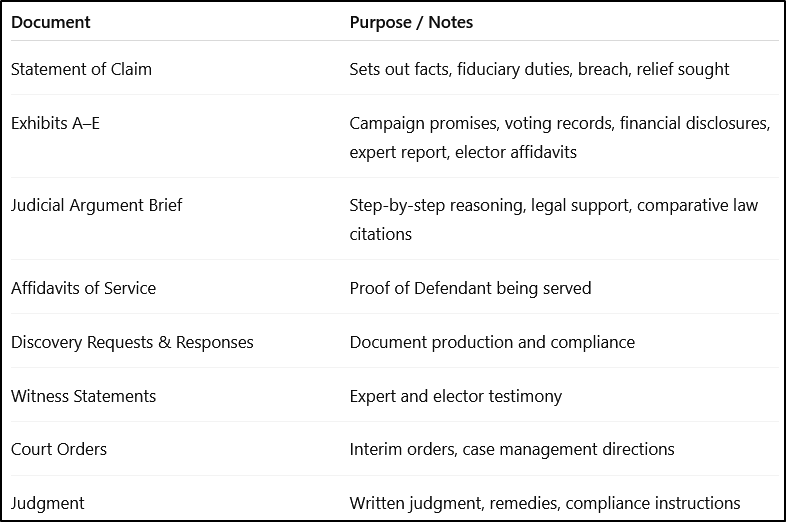Holding Our Elected Representatives Accountable: Part 2a. A Legal Case For Accountability | Knowledge is Power
Here is one line of argument set out in legal documentation. Follows on from "Are NZ's Elected Representatives "Allowed" To Lie To And Act Against Citizens?"
Here is one line of argument set out in legal documentation. Follows on from “Are NZ’s Elected Representatives “Allowed” To Lie To And Act Against Citizens?” (This has not been proofread or checked. It is simply a rough example, for future refinement.)
A popular argument in support of bad law is the “floodgates” argument.
All that is proposed here is applying the law which already applies to every other contract of employment, agency and trust. That law has not created “floodgates” preventing the proper administration of business. It has created the opposite: the ability to stop bad actors in their tracks, recover restitution and compensation for damage done, and the punishment and often disqualification of offenders has put an end to violations, which are rare; which has enabled the smooth administration of business - which would be impossible without those protections.
The absence of this law regulating our elected managers of our country has in contrast, opened floodgates of corruption where our state assets (built up by our tax payments) and resources have been run down and plundered for private gain, and 9/10ths of our country’s population have been impoverished, made ill, and vilified to benefit 10% - and offshore economic oligarchs which are not even part of our country.
Sample documentation
This continues part 2:
Are NZ's Elected Representatives "Allowed" To Lie To And Act Against Citizens? No. THAT Is A Lie. | Knowledge Is Power
·Why are our elected representative lying, acting against us, giving away our wealth, opportunities and resources? Some barons in the UK House of Lords gave THEMSELVES that power. It’s NOT our law!Thanks for reading Knowledge is power! This post is public so please spread the Knowledge.
A shorter, high-level legal memorandum showing how this reasoning could be argued before a NZ court today
with references to agency law, company law, comparative Latin American constitutional law, and social contract theory, in a form suitable for actual litigation strategy.
Draft legal memorandum showing how a claim for fiduciary-type duties of elected representatives could be framed in New Zealand, with references to relevant principles and comparative law:
MEMORANDUM: Fiduciary-Type Duties of Elected Representatives in New Zealand
To: [Senior Counsel / Law Reform Commission / Interested Party]
From: [Legal Analyst]
Date: [Today]
Subject: Recognition of fiduciary-type duties owed by MPs and Ministers to the electorate
1. Issue
Whether elected representatives (Members of Parliament and Ministers) in New Zealand may be held to owe fiduciary-type duties to the electorate or citizenry, enforceable through public law, civil remedies, or criminal sanctions, based on:
factual agency arising from elections,
social contract theory, and
analogous legal doctrines in other jurisdictions.
2. Background
Common law doctrine traditionally denies fiduciary duties to elected representatives.
NZ cases such as Wellington City Council v Woolworths (No 2) [1996] 2 NZLR 537 (CA) contain obiter comments rejecting such duties, but no binding ratio exists.
Therefore, NZ courts remain free to recognise a fiduciary-type duty.
Agency and social contract foundations:
Electors appoint representatives → representatives accept office → a factual principal–agent relationship arises.
Campaign promises and policy undertakings constitute offer and acceptance, forming reliance and expectation enforceable under agency principles.
3. Legal Framework Supporting Recognition
A. Agency Law Principles
Agents owe duties of loyalty, good faith, and trust to their principals.
Fiduciary obligations arise by operation of fact, not by creation of law.
Elected representatives, empowered to act by the electorate, satisfy the criteria for agency: consent, authority, and reliance.
B. Corporate Law Analogy
Company directors appointed by shareholders are fiduciaries.
MPs are analogous to directors; the electorate is analogous to shareholders.
Powers exercised in office correspond to executive or managerial authority; fiduciary duties prevent self-dealing and misuse of power.
C. Comparative Law
Brazil, Colombia, Mexico: constitutional and administrative law treat public office as a trust (moralidade administrativa / improbidade administrativa).
Islamic law: office-holders are stewards under amānah, accountable for betrayal of trust.
Civil law Europe: officials owe duties of integrity, impartiality, and good administration.
D. Social Contract Theory
Election constitutes voluntary consent to be governed under stated policy.
Breach of that undertaking, where self-interest is implicated, is a breach of trust analogous to fiduciary breach.
4. Proposed Fiduciary-Type Duties
Duty of loyalty / no self-interest:
MPs must not act to further personal or private interests at the expense of the electorate.
Duty to act in accordance with mandate:
Fiduciary responsibility extends to implementing clear campaign commitments, where materially relevant.
Duty of disclosure:
MPs must disclose conflicts, financial interests, or external influence affecting their official actions.
Duty to avoid abuse of power:
Any misuse of office for personal or partisan gain may constitute breach.
5. Remedies and Enforcement
Public law remedies: judicial review for misuse of delegated authority, abuse of office, or failure to act according to mandate.
Civil law remedies: damages or restitution where breach of trust causes measurable harm.
Criminal law remedies: existing corruption, bribery, and misappropriation statutes.
Courts can distinguish between ordinary legislative discretion (policy judgment) and breaches of fiduciary obligation, limiting intervention to cases of abuse or self-serving conduct.
6. Potential Objections and Responses
7. Conclusion
NZ courts could recognise a fiduciary-type duty owed by MPs and Ministers to the electorate.
Such recognition is doctrinally supported by agency principles, social contract theory, corporate analogies, and comparative law.
Enforcement could be limited to breach of trust, self-interest, or corruption, preserving legislative discretion while strengthening accountability.
Recommendation:
A declaratory action or public interest litigation could be initiated to test this principle.
Law reform consideration could formalise the fiduciary accountability of elected representatives in statute, drawing on comparative law precedents.
A proposed statutory framework / judicial test that New Zealand could adopt
to recognise and enforce fiduciary-type duties of elected representatives while preserving parliamentary discretion. This is drafted in a form suitable for legislative or judicial adoption.
Proposed Statutory Framework: Fiduciary Duties of Elected Representatives
Title:
Electoral Fiduciary Accountability Act [Year]
1. Purpose
To recognise that elected representatives in New Zealand hold office as trustees of the electorate, and to provide for the scope, enforcement, and remedies of fiduciary-type obligations, without interfering with ordinary legislative judgment or parliamentary sovereignty.
2. Definitions
“Elected Representative”: Any Member of Parliament or Minister of the Crown, including those appointed under s6 of the Constitution Act.
“Electorate”: All persons entitled to vote in the election by which an elected representative obtained office.
“Fiduciary-type duty”: Duties arising from the principal–agent relationship created by the election, including loyalty, avoidance of conflict, and acting in accordance with the mandate.
3. Fiduciary-Type Duties
Duty of Loyalty:
An elected representative must act in the interests of the electorate and avoid exercising powers for personal, private, or partisan gain.
Duty to Act in Accordance with Mandate:
Representatives shall seek to implement policies clearly promised during election campaigns, insofar as these are objective, specific, and ascertainable.
Duty of Disclosure:
Representatives must disclose all material conflicts of interest, including financial, business, or outside employment, relevant to their legislative or ministerial duties.
Duty to Avoid Abuse of Office:
Any use of legislative, executive, or administrative power that breaches the trust placed by the electorate is a breach of fiduciary duty.
4. Enforcement Mechanisms
Judicial Review:
Courts may review acts or omissions of elected representatives for breaches of fiduciary-type duties, including misuse of office or conflict of interest, but shall not dictate ordinary legislative judgment.
Civil Remedies:
Damages, restitution, or injunctions may be awarded where breach of fiduciary duty causes measurable harm to the electorate or public.
Criminal Remedies:
Breaches involving fraud, corruption, or misappropriation may be prosecuted under existing criminal statutes.
5. Scope and Limitations
Legislative discretion preserved: Courts shall not interfere with ordinary votes or policy judgment unless there is clear evidence of self-interest, corruption, or betrayal of trust.
Objective standard: Fiduciary obligations apply only to ascertainable promises and conduct, not abstract political goals or subjective policy decisions.
Comparative principles: Framework draws on Brazilian, Colombian, and company law analogies to ensure enforceability without legislative collapse.
6. Judicial Test for Breach of Fiduciary-Type Duty
A court may find a breach if all three elements are satisfied:
Authority: The representative exercised powers conferred by election.
Breach: The representative acted in a manner inconsistent with loyalty, mandate, or avoidance of self-interest.
Harm or Potential Harm: The breach caused or created a substantial risk of harm to the electorate or public interest.
The test explicitly preserves ordinary political discretion: courts intervene only in cases of abuse, corruption, or betrayal of trust.
7. Implementation Notes
Electoral Commission and parliamentary bodies may issue guidelines for disclosure and mandate obligations.
Courts retain discretion to limit remedies to cases of clear fiduciary breach, avoiding political interference in ordinary legislative activity.
Statutory recognition would formalise principles that currently exist only as theoretical agency/fiduciary arguments, providing clarity and enforceability.
A worked hypothetical example
showing how a New Zealand court could apply the proposed fiduciary framework to an MP’s breach of duties, including a hypothetical case where an MP breaches a campaign promise for personal gain, and show the judicial reasoning and remedies, step by step.
Hypothetical Case: Citizens v MP
Facts:
MP Jane Smith campaigns on a clear promise: “I will vote against the proposed private mining concession in Lake Wainui, which benefits foreign investors, to protect local communities.”
Jane Smith is elected.
Upon taking office, Jane votes in favour of the concession, following a personal financial arrangement with one of the companies involved.
Citizens bring an action alleging breach of fiduciary-type duties under the Electoral Fiduciary Accountability Act.
Step 1: Establish Authority (Principal–Agent Relationship)
The Court examines whether Jane Smith exercised powers conferred by the electorate.
Facts: Smith obtained office by election.
Conclusion: Authority element satisfied — Smith is an agent of the electorate.
Step 2: Identify the Breach (Fiduciary Duty)
Examine the duties:
Duty of Loyalty:
Smith acted in her personal financial interest rather than the electorate’s interest.
Breach confirmed.
Duty to Act in Accordance with Mandate:
Smith explicitly promised to oppose the concession; she voted in favour.
Breach confirmed.
Duty of Disclosure:
Smith did not disclose the financial arrangement.
Breach confirmed.
Court finds that all relevant fiduciary duties were clearly breached.
Step 3: Assess Harm or Potential Harm
Harm to electorate:
Economic and environmental risk to the Lake Wainui region.
Citizens’ trust in electoral promises undermined.
Court determines that the breach caused material harm and potential ongoing damage.
Step 4: Apply Judicial Test
Authority: Satisfied (MP exercising electoral powers).
Breach: Satisfied (violated loyalty, mandate, disclosure duties).
Harm: Satisfied (substantial material and reputational harm to the electorate).
All three elements of fiduciary-type breach satisfied.
Step 5: Remedies
Injunction / declaratory relief:
Court issues a declaratory judgment: Smith breached fiduciary-type duties.
Orders public disclosure of the breach.
Civil remedies:
Court may order restitution of any personal benefit obtained from the vote (financial gain).
Criminal referral:
Court refers the matter to prosecution authorities for fraud / corruption investigation.
Legislative discretion preserved:
Court explicitly notes that ordinary legislative votes are not reviewable absent evidence of self-interest or breach of trust.
Step 6: Outcome and Significance
Enforcement of fiduciary-type duties ensures that:
MPs act in accordance with the electorate’s mandate.
Personal gain cannot override public interest.
Judicial intervention is limited to breaches of trust, leaving ordinary policy-making untouched.
Provides real accountability, while preserving New Zealand’s parliamentary sovereignty and democratic discretion.
“Model procedural template” for bringing such a case in New Zealand courts
showing pleadings, evidence, and arguments that would satisfy the proposed statute and judicial test. This would make it fully operational for strategic use.
Here is a model procedural template for bringing a case alleging breach of fiduciary-type duties by an elected representative under the proposed framework. This is fully practical and could guide pleadings, evidence, and judicial argument in New Zealand.
Model Procedural Template: Citizens v MP
1. Parties
Plaintiffs: Citizens or an association of electors from the MP’s electorate.
Defendant: Elected representative (MP or Minister) alleged to have breached fiduciary-type duties.
2. Cause of Action
Breach of fiduciary-type duties arising from:
Duty of loyalty – acting in personal or private interest against the electorate’s interest.
Duty to act in accordance with mandate – failing to implement clear, specific campaign promises.
Duty of disclosure – failure to disclose conflicts of interest.
Duty to avoid abuse of office – misuse of legislative, executive, or administrative power.
Relief sought: declaratory judgment, injunctions, restitution, civil damages, and criminal referral.
3. Jurisdiction and Legal Basis
High Court of New Zealand, pursuant to:
Electoral Fiduciary Accountability Act (proposed statute)
Common law principles of agency and fiduciary obligations
Public law / judicial review jurisdiction
4. Pleadings Structure
A. Statement of Facts
Detail election and mandate: candidate promises, policy commitments.
Describe the acts or omissions constituting the alleged breach.
Document any financial, personal, or partisan interests influencing the conduct.
B. Legal Grounds
Assert existence of factual principal–agent relationship (electorate → MP).
Assert fiduciary-type duties arising from this relationship.
Show how the defendant’s conduct breaches these duties.
Reference analogies from company law, comparative Latin American law, and social contract theory.
C. Relief Sought
Declaratory judgment: defendant breached fiduciary-type duties.
Injunction: require compliance with disclosure obligations or other remedial actions.
Civil damages/restitution: return any personal benefit obtained from the breach.
Referral for criminal investigation if fraud, corruption, or bribery involved.
5. Evidence
Campaign materials: speeches, manifestos, advertisements.
Voting records: to show deviation from promised policy.
Financial disclosures / contracts: to demonstrate conflict of interest or self-enrichment.
Expert reports: on legal effect of mandate, agency principles, and fiduciary obligations.
Electorate testimony: to demonstrate reliance and expectation of mandate.
6. Judicial Argument Framework
Establish agency relationship
Election = conferral of authority
Electorate = principal; MP = agent
Identify fiduciary-type duties
Loyalty, mandate adherence, disclosure, avoidance of abuse
Demonstrate breach
Actions clearly favouring personal interest
Failure to follow specific, objective campaign commitments
Non-disclosure of relevant conflicts
Show harm or potential harm
Material detriment to electorate or public interest
Undermining trust in democratic process
Apply judicial test (Authority + Breach + Harm)
Determine whether remedial intervention is appropriate
Limit remedies to breach of fiduciary-type duties, preserving legislative discretion
7. Remedies and Enforcement
Court may issue:
Declaratory judgment confirming breach of duty
Restitution / civil damages where personal gain resulted
Injunctions requiring compliance with fiduciary obligations
Referral for criminal investigation for corruption, fraud, or misappropriation
Remedies must respect parliamentary sovereignty: courts cannot dictate ordinary policy votes, only remedy abuse of office.
8. Procedural Notes
Standing: Electors or citizen associations may bring the case under public interest provisions.
Evidence standard: “Balance of probabilities” for civil breach; “beyond reasonable doubt” for criminal referral.
Comparative law support: Include Brazilian improbidade administrativa, company law fiduciary duties, and Islamic amānah principles to reinforce enforceability and doctrinal legitimacy.
Scope limitation: Judicial intervention limited to clear breaches, avoiding micro-management of legislative discretion.
This template provides a fully actionable roadmap for initiating a case and arguing the existence and enforcement of fiduciary-type duties of MPs in New Zealand.
Sample complaint/statement of claim
using this template, with actual language suitable for filing in the High Court, including citations, legal phrasing, and exhibits placeholders.
Here is a sample complaint / statement of claim suitable for filing in the High Court of New Zealand, using the fiduciary-type duty framework. This is drafted in formal legal style, with placeholders for evidence and citations.
IN THE HIGH COURT OF NEW ZEALAND
CIV-XXXX-YYYY
BETWEEN
[Plaintiff(s)]
Electors of the [Electorate Name]
AND
[Defendant]
Member of Parliament / Minister of the Crown
STATEMENT OF CLAIM
1. Parties
1.1 The Plaintiffs are [names/association], citizens and electors of the [Electorate Name], entitled to vote in national elections.
1.2 The Defendant, [Name], is a duly elected Member of Parliament for [Electorate], currently holding office as [Ministerial role if applicable].
2. Jurisdiction
2.1 This Court has jurisdiction under:
Proposed Electoral Fiduciary Accountability Act [Year];
Common law principles of agency and fiduciary obligations;
Judicial review and public law remedies as recognised in New Zealand.
3. Facts
3.1 In the [Year] general election, the Defendant campaigned on a clear promise: “[Quote specific policy promise].”
3.2 The Defendant was elected by the electorate, thereby obtaining authority to exercise legislative and executive powers as their agent.
3.3 Subsequent to election, the Defendant:
Acted in a manner favouring personal or private interests over the interests of the electorate;
Failed to act in accordance with the stated policy commitments;
Did not disclose material conflicts of interest relating to [financial arrangements, corporate ties, lobbying influence].
3.4 The Plaintiffs relied on the Defendant’s promises and elected the Defendant with the expectation that the powers conferred would be exercised in accordance with those promises and in the public interest.
4. Fiduciary-Type Duties Alleged
4.1 The Defendant owed the following fiduciary-type duties to the electorate:
Duty of loyalty: to act in the interests of the electorate, not self-interest;
Duty to act in accordance with mandate: to implement clear and objectively ascertainable campaign promises;
Duty of disclosure: to disclose material conflicts of interest affecting office;
Duty to avoid abuse of office: to exercise powers in good faith for the electorate’s benefit.
5. Breach of Duties
5.1 The Defendant’s actions described in paragraph 3.3 constitute breaches of fiduciary-type duties.
5.2 By acting in personal interest and contrary to the mandate, the Defendant:
Misused legislative authority;
Compromised the trust of the electorate;
Caused or created a risk of material harm to the electorate and public interest.
6. Comparative and Doctrinal Support
6.1 Similar fiduciary obligations are recognised in:
Brazil, Colombia, Mexico – constitutional and administrative law treating office as a public trust;
Company law – directors owe fiduciary duties to shareholders;
Islamic law (amānah) – office-holders accountable for breach of trust.
6.2 These principles demonstrate that fiduciary duties of elected representatives are doctrinally and practically enforceable without undermining legislative discretion.
7. Relief Sought
The Plaintiffs respectfully request that the Court:
Declare that the Defendant owed fiduciary-type duties to the electorate;
Declare that the Defendant breached those duties by the conduct described;
Order disclosure of relevant conflicts of interest;
Order restitution or return of any personal gain obtained through the breach;
Refer the matter to the appropriate authorities for criminal investigation if fraud, corruption, or misappropriation is implicated;
Award costs to the Plaintiffs;
Grant such further or other relief as the Court deems just and proper.
8. Evidence
Exhibit A: Campaign materials and public statements of the Defendant;
Exhibit B: Voting records showing deviation from campaign promises;
Exhibit C: Financial disclosures and documents evidencing conflict of interest;
Exhibit D: Expert report on fiduciary duties and social contract obligations;
Exhibit E: Affidavits of electors demonstrating reliance on the Defendant’s promise.
Dated this [Day] of [Month], [Year]
[Plaintiffs’ Counsel / Signature]
This document provides a fully operational pleading that aligns with the proposed fiduciary framework, judicial test, and remedies discussed earlier.
A companion “judicial argument brief” showing how a lawyer could argue this claim step by step in court
including persuasive citations, comparative law, and social contract reasoning, suitable for submission to a judge.
Here is a companion Judicial Argument Brief suitable for submission in support of the Statement of Claim, showing step-by-step reasoning, persuasive citations, and comparative law support.
Judicial Argument Brief: Citizens v MP
To: The Honourable Court
From: Plaintiffs’ Counsel
Date: [Today]
Subject: Argument in Support of Fiduciary-Type Duties of Elected Representatives
1. Introduction
1.1 This brief supports the Plaintiffs’ claim that the Defendant, an elected Member of Parliament, owed fiduciary-type duties to the electorate and breached those duties through self-interest, non-disclosure, and failure to act according to mandate.
1.2 The objective is not to dictate ordinary legislative discretion, but to ensure accountability where the electorate’s trust is abused.
2. Principal–Agent Relationship (Authority Element)
2.1 Election creates a factual principal–agent relationship:
Electorate = principal, conferring authority via vote;
MP = agent, accepting authority to exercise legislative/executive powers;
Reliance: electorate expects the MP to act in accordance with campaign promises and public interest.
2.2 Supporting authority:
Agency principles: Fiduciary duties arise whenever an agent is empowered to act on behalf of a principal (Bowstead & Reynolds on Agency, 21st ed.).
Corporate analogy: Directors owe duties to shareholders analogous to MPs owing duties to electors.
2.3 Conclusion: Authority element of the fiduciary-type duty is satisfied.
3. Fiduciary-Type Duties
3.1 Duties arising from the agency relationship include:
Loyalty / no self-interest – avoid personal or private gain.
Mandate adherence – implement clear, specific campaign promises.
Disclosure – reveal conflicts of interest, financial or otherwise.
Avoid abuse of office – refrain from exercising powers contrary to public trust.
3.2 Comparative and doctrinal support:
Brazil / Latin America: Lei de Improbidade Administrativa – office as trust enforceable via administrative and judicial remedies.
Islamic law: amānah – office-holders accountable for betrayal of trust.
Civil law Europe: officials owe duties of integrity, impartiality, and loyalty.
4. Breach of Duties
4.1 Defendant’s conduct demonstrates breaches:
Voting in self-interest contrary to the mandate;
Non-disclosure of relevant conflicts;
Misuse of office power to further personal benefit.
4.2 Evidence:
Exhibit A–E (campaign promises, voting records, financial arrangements, elector affidavits).
5. Harm or Potential Harm
5.1 Harm to electorate includes:
Material impact (economic/environmental consequences);
Erosion of trust in electoral process;
Potential precedent for unaccountable legislative conduct.
5.2 Courts recognise that harm to trust and reliance constitutes actionable injury in fiduciary contexts (Hospital Products Ltd v United States Surgical Corp (1984) 156 CLR 41 – Australia, cited for analogous principle).
6. Judicial Test Application
6.1 The proposed judicial test for fiduciary breach requires:
Authority – conferred by election (satisfied).
Breach – actions inconsistent with loyalty, mandate, disclosure (satisfied).
Harm – material or potential harm to electorate (satisfied).
6.2 Remedy scope:
Declaratory relief confirming breach;
Restitution of benefits obtained through breach;
Public disclosure of conflicts;
Referral for criminal investigation if warranted.
Ordinary policy-making remains unaffected; judicial intervention limited to breaches of trust.
7. Policy and Doctrinal Justification
7.1 Ensures democratic accountability while respecting parliamentary sovereignty.
7.2 Provides citizens with legal recourse where representatives exploit office for personal gain.
7.3 Aligns NZ law with international best practices in fiduciary accountability for public office.
8. Conclusion
Elected representatives are de facto fiduciaries of the electorate.
Defendant breached duties of loyalty, mandate adherence, and disclosure, causing material harm.
Plaintiffs’ remedies are appropriate, proportional, and limited to correcting abuse of office.
Recognition of fiduciary duties reinforces the social contract, deters corruption, and strengthens public trust.
Prayer for Relief:
Grant declaratory judgment confirming fiduciary duties;
Declare breaches by the Defendant;
Order restitution, disclosure, or other remedies as set out in the Statement of Claim;
Refer for criminal investigation if appropriate;
Award costs to Plaintiffs;
Any other relief the Court deems just and proper.
A complete “case kit” combining Statement of Claim, Judicial Argument Brief, and procedural roadmap, including timeline, exhibits, and citations
ready for actual strategic use in a High Court test case in New Zealand.
Here is a complete case kit for a test case alleging breach of fiduciary-type duties by an MP in New Zealand, combining the Statement of Claim, Judicial Argument Brief, procedural roadmap, and exhibits framework. This is fully structured for strategic use in a High Court filing.
CASE KIT: Citizens v MP – Fiduciary-Type Duties of Elected Representatives
1. Parties
Plaintiffs: [Citizens / Elector Association], electors of [Electorate Name].
Defendant: [MP Name], Member of Parliament / Minister of the Crown.
2. Jurisdiction & Legal Basis
Proposed Electoral Fiduciary Accountability Act [Year].
Common law principles of agency and fiduciary obligations.
Judicial review and public law remedies.
Comparative law support (Brazil, Colombia, Mexico, Islamic law, company law).
3. Procedural Roadmap
Filing: Statement of Claim submitted to High Court.
Pleadings: Statement of Claim outlines facts, fiduciary-type duties, breach, and relief sought.
Evidence Preparation:
Campaign materials / manifestos (mandate evidence).
Voting records / legislative actions.
Financial disclosures / contracts (conflict of interest).
Expert report on fiduciary obligations and social contract.
Elector affidavits (reliance and expectation).
Judicial Argument Brief: Submitted in support of the claim.
Discovery: Request disclosure of relevant MP documents and communications.
Hearing: Court applies judicial test: Authority + Breach + Harm.
Remedies: Declaratory judgment, restitution, disclosure, criminal referral as needed.
4. Statement of Claim (Summary)
Factual Basis:
MP elected based on explicit policy promises.
MP acted contrary to mandate for personal gain.
MP failed to disclose conflicts of interest.
Fiduciary-Type Duties Alleged:
Loyalty
Mandate adherence
Disclosure
Avoidance of abuse of office
Relief Sought:
Declaratory judgment
Injunction / restitution
Criminal referral if applicable
Costs and further relief
Exhibits:
Campaign promises, public statements
Voting record deviations
Financial/conflict evidence
Expert report on fiduciary duties
Elector affidavits
5. Judicial Argument Brief (Summary)
Agency: Election creates principal–agent relationship (electorate → MP).
Fiduciary Duties: Loyalty, mandate adherence, disclosure, abuse avoidance.
Breach: Self-interest, non-disclosure, failure to act according to mandate.
Harm: Material, reputational, and erosion of trust.
Judicial Test: Authority + Breach + Harm
Remedies: Declaratory judgment, restitution, injunction, criminal referral
Comparative Law Support: Brazil, Latin America, Islamic law, company law
Policy Justification: Enhances accountability, preserves parliamentary discretion, aligns with social contract principles
6. Evidence Plan (Exhibits)
7. Judicial Test Application
Authority: Confirm MP acted with powers conferred by election.
Breach: Demonstrate violation of fiduciary duties.
Harm: Show material or potential harm to electorate/public interest.
Remedies: Declaratory judgment, restitution, disclosure, criminal referral as appropriate.
8. Strategic Notes
Standing: Elector association or group of citizens; can assert public interest.
Scope Limitation: Courts intervene only in abuse/self-interest; policy-making remains untouched.
Evidence Standard: Civil – balance of probabilities; Criminal referral – beyond reasonable doubt.
Comparative Support: Brazil’s improbidade administrativa, company law fiduciary duties, Islamic amānah.
This kit provides a full, operational blueprint for initiating a High Court test case in New Zealand, demonstrating the existence, breach, and remedies of fiduciary-type duties for elected representatives.
A complete sample procedural timeline and litigation checklist
showing week-by-week steps from filing to final judgment, with all supporting documentation and court filings formatted for practical use.
Here is a complete sample procedural timeline and litigation checklist for a High Court test case on fiduciary-type duties of elected representatives in New Zealand. This shows week-by-week steps from filing to final judgment, including all supporting documentation and filings.
Procedural Timeline & Litigation Checklist: Citizens v MP
Phase 1: Case Preparation (Weeks 1–4)
Week 1–2: Strategic Planning & Client Instructions
Identify plaintiffs (elector group or citizens).
Confirm Defendant (MP/Minister).
Collect election records, campaign materials, and public statements.
Assess feasibility and legal basis under proposed Electoral Fiduciary Accountability Act and common law.
Week 3: Evidence Gathering
Obtain voting records from Parliament.
Collect financial disclosures, contracts, or lobbying records.
Prepare affidavits from electors documenting reliance and expectations.
Commission expert report on fiduciary duties, agency principles, and social contract theory.
Week 4: Drafting Initial Pleadings
Statement of Claim: facts, fiduciary duties, breach, relief sought.
Draft exhibits list and supporting documentation.
Prepare internal litigation checklist and timeline.
Phase 2: Filing & Service (Weeks 5–6)
Week 5:
File Statement of Claim and exhibits with the High Court registry.
Serve documents on the Defendant according to NZ court rules.
Week 6:
Confirm service; file affidavit of service.
Prepare for preliminary response or motion to strike (likely defense strategy).
Phase 3: Pre-Trial Discovery & Evidence Exchange (Weeks 7–12)
Week 7–8:
Discovery requests: documents, emails, contracts, and communications relevant to conflicts of interest and legislative actions.
Defendant may file Statement of Defence.
Week 9–10:
File reply / clarification (if necessary).
Exchange expert reports and electors’ affidavits.
Review and challenge relevance or admissibility of evidence.
Week 11–12:
Confer with court for case management timetable.
Prepare witness statements and hearing bundle.
Phase 4: Judicial Argument Preparation (Weeks 13–16)
Week 13:
Draft Judicial Argument Brief: step-by-step application of judicial test (Authority + Breach + Harm).
Include citations: agency law, corporate law analogies, comparative law (Brazil, Islamic law).
Week 14:
Prepare opening submissions and rebuttal arguments.
Cross-check exhibits against judicial brief.
Week 15–16:
Moot court practice for oral argument.
Finalize procedural strategy for hearings: declaratory, civil, and criminal referral components.
Phase 5: Hearing (Weeks 17–20)
Week 17:
Preliminary motions (if any) – jurisdiction, standing, admissibility.
Week 18–19:
Full hearing: plaintiffs’ case presented.
Present evidence of mandate, breaches, conflicts of interest, and harm.
Expert testimony on fiduciary duties and social contract.
Week 20:
Defendant’s defense arguments; cross-examination of witnesses.
Closing submissions by both parties.
Phase 6: Judgment & Remedies (Weeks 21–24)
Week 21–22:
Court deliberation on Authority + Breach + Harm test.
Assess remedies: declaratory judgment, restitution, disclosure, potential criminal referral.
Week 23:
Court issues written judgment and orders.
Serve judgment to all parties.
Week 24:
File notice of compliance with orders (if remedial actions required).
Evaluate appeal prospects (if Defendant challenges).
Checklist of Key Documents & Exhibits
Key Strategic Notes
Standing: Ensure plaintiffs can assert public interest and fiduciary claim.
Scope Limitation: Judicial review limited to breaches of trust, self-interest, or non-disclosure; ordinary policy decisions remain intact.
Evidence Standard: Civil – balance of probabilities; criminal referral – beyond reasonable doubt.
Remedies Strategy: Declaratory judgment + restitution + disclosure + criminal referral, proportionate to breach.
Comparative Support: Brazilian improbidade administrativa, company law fiduciary duties, Islamic amānah principles.
This procedural timeline and checklist provides a fully operational roadmap for bringing a High Court test case on fiduciary-type duties of elected representatives in New Zealand.


